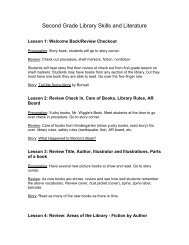Kindergarten Library Skills and Literature - Roseburg Public Schools
Kindergarten Library Skills and Literature - Roseburg Public Schools
Kindergarten Library Skills and Literature - Roseburg Public Schools
You also want an ePaper? Increase the reach of your titles
YUMPU automatically turns print PDFs into web optimized ePapers that Google loves.
Review: Showing examples of previous pages, review what was learned.Lesson: Explain that sometimes authors <strong>and</strong> publishers put special helpful pagesin the book. One of these is a glossary, which is like a little dictionary. It isn’t likeour big dictionary that has all the words of the English language. It only haswords that are found in this book. It might tell you how to pronounce the word,what it means <strong>and</strong> how it is spelled. It is in alphabetical order just like a regulardictionary so that you can easily find the words. A glossary saves you time soyou don’t have to find a dictionary to look up words. It is usually found in the backof the book <strong>and</strong> a Table of Contents will tell you if the book has one.Show samples of glossaries. Have students guess what the book might be aboutby the words in the glossary. Have students give the definitions of some of thewords. Now have students turn to the Table of Contents <strong>and</strong> have them findwhich page the glossary is on.Using recipe pages, read some parts of recipe that have words we don’t know,transfer those words to Glossary page. This activity is done together.Lesson 21: Parts of a Book - IndexPreparation: Overheads of various examples of indexes <strong>and</strong> cookbook index.Student supplies.Review: Showing examples of previous pages, review what was learned.Lesson: Explain that our Table of Contents gives us the chapters of our book. Butwhat if we wanted to know the page of a certain recipe? If we had a big cookbook<strong>and</strong> wanted to make chocolate chip cookies, we might be able to find the cookiechapter, but we would have to look through all the cookie recipes to find it. Butthere is a special page that gives up little pieces of information instead of just thechapters. This special page is called an Index. Just like a glossary, it is usually inthe back of a book. Show samples of an index. Point out that it is in alphabeticalorder just like a glossary. Discuss the small pieces of information on these pages<strong>and</strong> ask students on which pages they can find the information. Show anexample of a Glossary-Index. Explain that sometimes a publisher will put the twotogether because they are both found in the back of the book <strong>and</strong> are inalphabetical order.Have students turn to the Table of Contents in their cookbook <strong>and</strong> find what pageour Index is on. Students may work individually or with others at their tables tofind the page numbers for the different recipes <strong>and</strong> fill out the Index. Monitorstudents. Fill out sample on overhead when everyone is done to make sure theanswers are right.
















